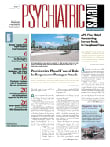Efforts to cut Medicaid costs in Oregon have left many individuals with schizophrenia uninsured and may have resulted in increased involuntary psychiatric hospitalizations.
This is the finding of a new study in the August Psychiatric Services that compared the use of state psychiatric hospitals by individuals with schizophrenia who lost their Medicaid coverage due to state cutbacks with that of enrollees who retained their benefits.
According to the study's findings, Oregon's expansion of eligibility requirements for Medicaid in the early 1990s resulted in a huge influx of newly insured individuals, including many suffering from schizophrenia and other serious mental illnesses. But in 2003, state officials attempted to rein in Medicaid spending, resulting in a virtual halving of the number of expansion-program enrollees. This included more than 4,000 beneficiaries who had been treated with antipsychotic medication or had a psychiatric hospitalization during the previous year.
Study authors Bentson McFarland, M.D., Ph.D., of Oregon Health and Science University's Department of Psychiatry and Jon Collins, Ph.D., of the State of Oregon Addictions and Mental Health Division-Salem's Program Analysis and Evaluation Unit saw the Medicaid boom and bust situation in Oregon as a "natural experiment" through which to assess the relationship between the coverage status of individuals with schizophrenia and the use of state psychiatric hospitals from 2002 to 2004.
For the study, McFarland and Collins reviewed the Medicaid, mental health, and vital-statistics records of those diagnosed with schizophrenia who had coverage in 2002 and received either outpatient mental health treatment or antipsychotic medication. Study participants, comprising mostly white males in their early 40s, were separated into three groups:
Cohort A: those having coverage in 2002 only,
Cohort B: those losing coverage after two years, and
Cohort C: those who maintained their coverage throughout the study period.
While approximately 20 percent of the members of each cohort were involuntarily admitted to a local general hospital from 2002 to 2004, the percentage of individuals involuntarily admitted to a state psychiatric hospital during that time suggested a direct correlation with the number of years they maintained coverage. Only 2 percent of those in cohort C required involuntary admission to a state psychiatric hospital during the study period, while 6 percent of cohort A and 16 percent of cohort B were involuntarily admitted to state psychiatric hospitals. The length of stay at state psychiatric hospitals also increased year after year for cohorts A and B.
The researchers concluded that Oregon's Medicaid cutbacks may not have resulted in state policymakers' intended savings, as the state is also responsible for the cost of any involuntary admissions to state psychiatric hospitals for uninsured patients.
